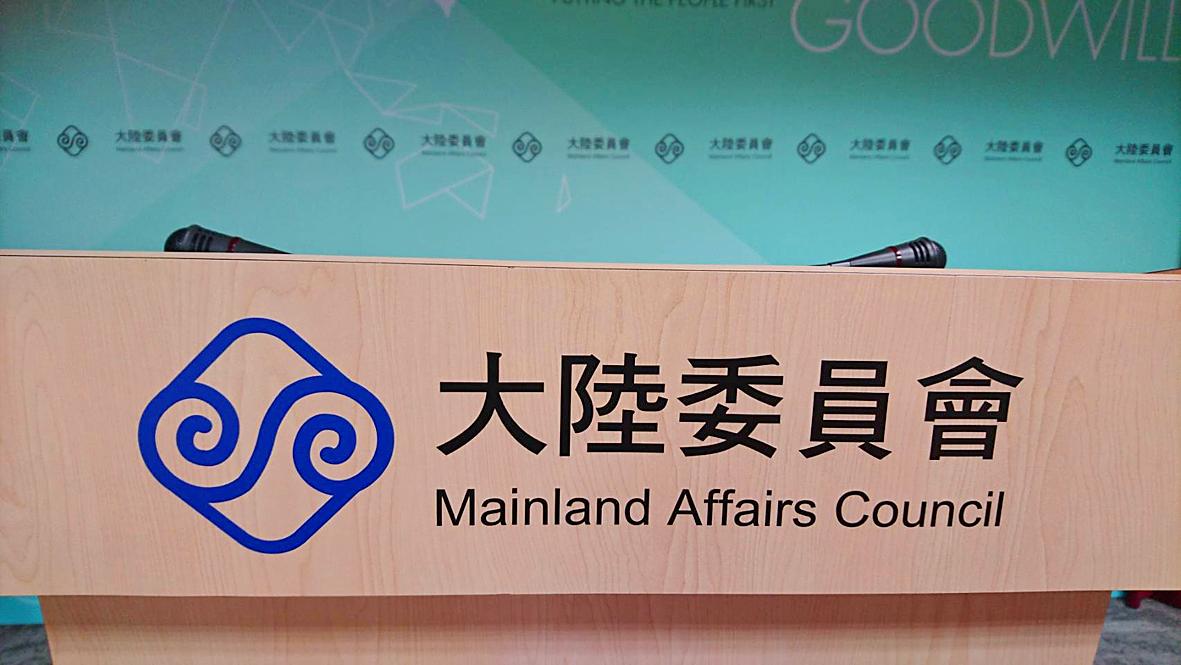China’s “united front” efforts targeting Taiwan are ubiquitous, and include the employment of Internet celebrities to carry out infiltration campaigns on social media, members of the Mainland Affairs Council’s (MAC) Advisory Committee said yesterday.
The council released the minutes of a committee meeting on China’s “legal war” against Taiwan and possible response measures.
The “legal war” aims to unilaterally define jurisdiction over Taiwan to legitimize annexing the nation based on Beijing’s so-called “democratic negotiations,” while preparing to negate Taiwanese legislation, the minutes said.

Photo: Chung Li-hua, Taipei Times
Committee members and academics who attended the meeting were not named in the minutes.
The National Security Law imposed by Beijing in Hong Kong is a model for China to draw up Taiwan-related regulations, the minutes said.
Globally, Beijing would continue to squeeze Taiwan’s international space and block the nation from joining international organizations as a sovereign state, they said.
On a civic level, Beijing aims to promote economic, social and cultural integration by linking identity documents for Taiwanese to China’s civic rights, it said.
To grasp the changes in China’s legislation related to Taiwan, the government should watch the implementation of Hong Kong’s National Security Law and the developments in the territory, the minutes said.
China’s legal war against Taiwan operates in tandem with other public opinion, psychological and diplomatic tactics, a committee member said.
Beijing has been employing Internet celebrities to wage “united front” and infiltration campaigns against Taiwan on video platforms or attack certain targets through social media, such as WeChat, in an attempt to circumvent legal regulations, the member said.
Taiwan should prepare countermeasures and share information with international partners to promote joint defense and security cooperation, the member added.
China’s legal war against Taiwan is ubiquitous, another committee member said, citing as examples Chinese People’s Liberation Army aircraft continuing to harass Taiwan and Beijing publicly denying the existence of the median line of the Taiwan Strait.
By rejecting the median line, Beijing is extending its dominion over Taiwan and unilaterally changing the cross-strait “status quo,” just as it enacted the National Security Law in Hong Kong and changed the territory’s “one country, two systems” framework, they said.
In addition to downgrading Taiwan’s international status, Beijing also purports to represent the nation’s interests in international disputes, as shown by its response to the arbitration of territorial disputes in the South China Sea, they said, adding that Taiwan should more actively express its objection to Beijing’s maneuvers.
Another committee member said that China has never abided by the rule of law, but only uses laws to achieve its political aims.
Beijing’s regulations about actual and claimed dominions are different, evidenced by the varied strength and flexibility of its National Security Law enacted in Hong Kong and its “Anti-Secession” Law targeting Taiwan, which deserves the nation’s unwavering attention, they said.

The Central Election Commission has amended election and recall regulations to require elected office candidates to provide proof that they have no Chinese citizenship, a Cabinet report said. The commission on Oct. 29 last year revised the Measures for the Permission of Family-based Residence, Long-term Residence and Settlement of People from the Mainland Area in the Taiwan Area (大陸地區人民在台灣地區依親居留長期居留或定居許可辦法), the Executive Yuan said in a report it submitted to the legislature for review. The revision requires Chinese citizens applying for permanent residency to submit notarial documents showing that they have lost their Chinese household record and have renounced — or have never

A magnitude 5.6 earthquake struck off the coast of Yilan County at 12:37pm today, with clear shaking felt across much of northern Taiwan. There were no immediate reports of damage. The epicenter of the quake was 16.9km east-southeast of Yilan County Hall offshore at a depth of 66.8km, Central Weather Administration (CWA) data showed. The maximum intensity registered at a 4 in Yilan County’s Nanao Township (南澳) on Taiwan’s seven-tier scale. Other parts of Yilan, as well as certain areas of Hualien County, Taipei, New Taipei City, Taoyuan, Hsinchu County, Taichung and Miaoli County, recorded intensities of 3. Residents of Yilan County and Taipei received

Taiwan has secured another breakthrough in fruit exports, with jujubes, dragon fruit and lychees approved for shipment to the EU, the Ministry of Agriculture said yesterday. The Animal and Plant Health Inspection Agency on Thursday received formal notification of the approval from the EU, the ministry said, adding that the decision was expected to expand Taiwanese fruit producers’ access to high-end European markets. Taiwan exported 126 tonnes of lychees last year, valued at US$1.48 million, with Japan accounting for 102 tonnes. Other export destinations included New Zealand, Hong Kong, the US and Australia, ministry data showed. Jujube exports totaled 103 tonnes, valued at

BIG SPENDERS: Foreign investors bought the most Taiwan equities since 2005, signaling confidence that an AI boom would continue to benefit chipmakers Taiwan Semiconductor Manufacturing Co’s (TSMC, 台積電) market capitalization swelled to US$2 trillion for the first time following a 4.25 percent rally in its American depositary receipts (ADR) overnight, putting the world’s biggest contract chipmaker sixth on the list of the world’s biggest companies by market capitalization, just behind Amazon.com Inc. The site CompaniesMarketcap.com ranked TSMC ahead of Saudi Aramco and Meta Platforms Inc. The Taiwanese company’s ADRs on Tuesday surged to US$385.75 on the New York Stock Exchange, as strong demand for artificial intelligence (AI) applications led to chip supply constraints and boost revenue growth to record-breaking levels. Each TSMC ADR represents